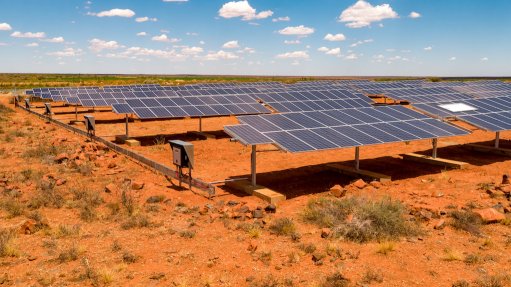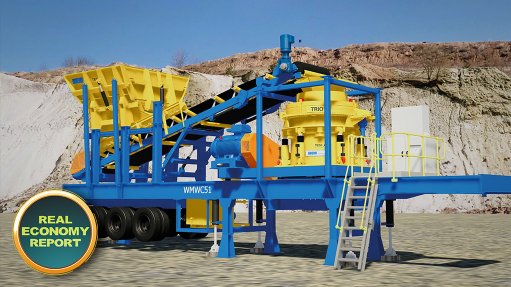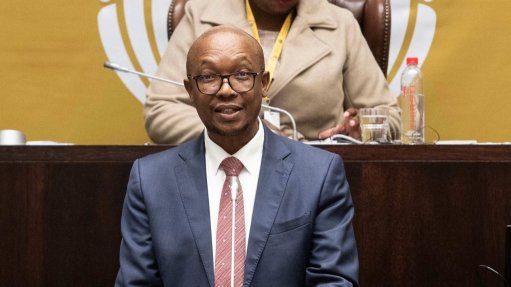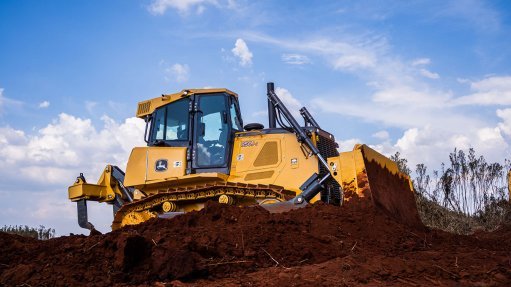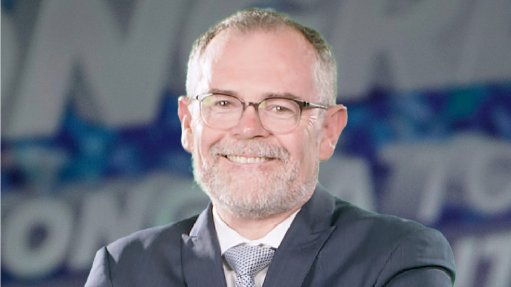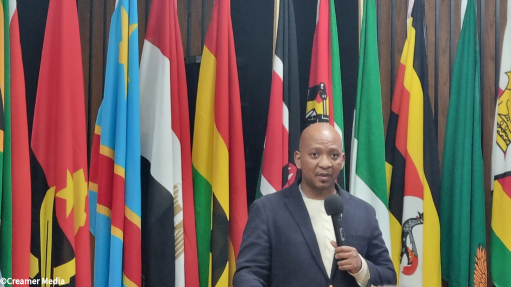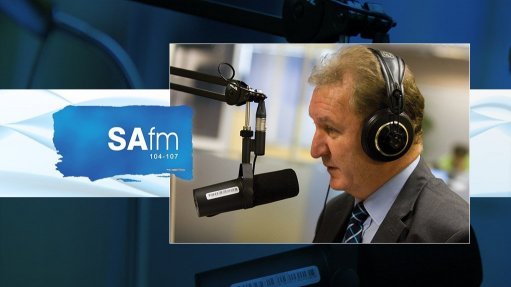Forest restructuring: seeing the wood for the trees
Of the 330 000 ha up for sale by the South African Forestry Company (Safcol) and the Department of Water Affairs and Forestry (Dwaf), 85 000 ha are in the hands of private owners as from this year.
Safcol was established in 1993, and registered as a government-owned company charged with managing the State's commercial forestry assets, amounting to 270 000 ha, explains Safcol CE Tienie van Vuuren.
At that stage it placed Safcol on fairly equal terms with the other two participants in the country's forestry industry, Sappi and Mondi, in terms of hectares controlled.
In 1996 it was decided that the State would sell Safcol and its assets, broken up into seven packages, to international or local parties.
The original seven packages for the purpose of the sell-off were Eastern Cape north, Kwazulu-Natal, Mpumalanga, Northern Province, Eastern Cape south, Western Cape and south Cape.
These packages were made available for invitations to offer in May 1999, with the understanding that Safcol, as a company with all its assets, could also be sold as a single entity.
The 70 000 ha of commercial forests in the former homelands, such as the Ciskei and Transkei, under the control of Dwaf after the 1994-democratic elections, were added to the seven packages, increasing the assets up for sale to 330 000 ha.
At the end of the first round of tenders, only two packages, consisting of 85 000 ha in total were sold.
In September Water Affairs and Forestry Minister Ronnie Kasrils reported to Parliament that the Eastern Cape north forestry assets of 70 000 ha were transferred to Singisi Forest Products, which is a joint venture between the forestry company, Hans Merensky, and the Singilanga Community Trust. The Kwazulu-Natal package, which is made up of 25 000 ha, has been sold to Siyaqhubeka Forests, which is a joint venture between Mondi and black-empowerment group, Imbokodvo Lemabalabala. Not all of the Kwazulu-Natal forests were sold – 7 000 ha were removed from the lease area to be incorporated into the Greater St Lucia Wetland Park as part of this World Heritage site.
Siyaqhubeka Forests has also agreed, as has Singisi, to set up a community trust which will involve the traditional leaders and communities living around the forests.
Following the 1999 tender process and the sale of only two packages this year, the question was: what to do with the remaining assets? Van Vuuren reports that government decided to merge the Mpumalanga and Northern Province assets into one package, called Komatiland, on which tenders to buy closed in early October.
This is seen as the crown of all Safcol's assets.
Dwaf chief director forestry Lael Bethlehem says three bidders have been shortlisted for Komatiland. African Forests Consortium represents South Africa, with overseas interest coming from Indian company, Pahapur, and the US-based GMO Renewable Resources.
A committee, consisting of all government departments and Safcol, has evaluated the bids put forward in September, and has made recommendations to Cabinet.
Bethlehem says Cabinet will consider the bids, and that an announcement on the sale of Komatiland is expected by the end of the year.
A preferred bidder was also announced for Eastern Cape south, but a dispute on debt between a sawmill owner and Safcol is delaying the sale, she adds.
The Western Cape and South Cape were merged into one asset, and withdrawn from the tender process.
These forests consist of about 70 000 ha that have been under trees for the last century, with some areas that could never be brought to profitability.
Cabinet has approved a proposal to phase out 35 000 ha of unprofitable plantation forests on this land.
The phasing-out process will involve cutting down the trees, and is due to take place over 20 years.
The other 35 000 ha will be retained as a forestry company, with international furniture manufacturer Steinhoff currently negotiating with Safcol and government regarding the future of timber assets in this area, while interested parties have been invited to register their concerns.
Some residents of the Western and south Cape, especially George and Knysna, are particularly unhappy about the deforested areas, as the open land now appears as scars between the tourist magnet natural forests, such as Tsitsikamma, in the area.
Van Vuuren says it has been a difficult period for Safcol since 1996, but that six years of uncertainty are now finally coming to an end.
Safcol, as a forestry company, has reached the end of the road as a commercial business, unless one of the packages is not sold and it still requires State management through Safcol.
Meanwhile, the 180-strong staff at head office and the five regional offices have been advised to apply for voluntary severance packages.
Personnel at the forestry company, numbering 4 500, have not been left in the lurch, though.
New forest owners will be forced to retain current employees for at least three years, and workers will have a 9% shareholding in the new entities they work for, in line with the conditions set by government.
The new owners are also expected to honour the existing conditions of employment as determined by Safcol, as well as contracts made by Safcol with sawmill owners.
The government, via Safcol, will be represented on the boards of the new companies.
All of the packages were also only up for sale for 75% ownership.
Government will initially hold a 25% stake, of which 9% is reserved for Safcol and Dwaf staff, 10% for future black economic empowerment opportunities, and 6% remains the State's share for at least the next five years.
The land on which the forests are located is also not sold as part of the package, but only leased for 70 years, with an option to renew for another 35 years.
Successful bidders pay substantial rentals for the land, with the funds being made available to succesful land claimants – and where there are no claimants, payments are made to legal entities created by communities in the area.
Bethlehem says these rentals amount to about R2-million a year payable by Singisi Forest Products, and about R5-million by Siyaqhubeka Forests.
What the future holds for the packages remaining to be sold is still an open question.
Van Vuuren says less than 2% of South Africa's surface is suitable for forestry. (The country has 1,48-million hectares of commercial forests.) He does not foresee the country's forestry area growing signifcantly, as South Africa does not have sufficient water, or a suitable climate – meaning there are no real blue-sky opportunities of establishing new forests should a company opt to expand rather than buy Safcol assets.
However, it is possible that the industry will face some changes after the sale of government-owned forests.
Safcol's focus was on the saw-log market, while the other two main participants in the industry are more focused on the paper and pulp market.
Safcol, with its 90% pine tree plantations, provides wood for 35% of the country's saw-log needs, while it also processes 10% of the country's saw logs at its five sawmills. (The mills are being sold as part of the packages.) Saw-logs are used for products such as roofs in construction or for joinery in furniture manufacture.
One of Safcol's interesting operations is its veneer plant in Graskop, in Mpumalanga.
With a price tag of R10 000 for one cubic metre of wood, veneer as a beneficiated product compares well with the price of pulp at about R100 per cubic metre of wood, explains Van Vuuren.
Safcol promoted the beneficiation of its wood aggressively, and new owners have the opportunity to continue to do so, states Van Vuuren.
The company is one of the first of a string of State assets to be sold by government, and to a degree it may set the tone for what will follow when the larger parastatals go up for sale. Kasrils stated in September that, while it is often said there is no progress in either restructuring of State assets or generating foreign investment in South Africa, the forestry sector belies this. He said government has made major strides in completing the restructuring of the commercial forest assets, in what is a joint programme with the Department of Public Enterprises.
Despite Kasrils's positive address to Parliament, though, rumours are that international interest in the forests waned because the process took too long.
It is said that an example would be one of Safcol's long-standing partners, the US-based Weyerhaeuser (one of the three biggest forestry companies in the world) which pulled out of South Africa after initial interest in the process, opting to rather establish a presence in the Australian forestry market.
Weyerhaeuser provided technical assistance to Safcol, and handled the South African company's international marketing.
Forest Owners Association (FOA) CE Mike Edwards says the privatisation process has taken far too long – more than five years has elapsed since the announcement that Safcol will be privatised. (The FOA represents all the major participants in the local forestry industry.) "The packages so far disposed of were at prices that are below what would have been achieved had the sales taken place earlier," he explains.
Edwards adds that it is disappointing that no overseas interest of any note was forthcoming at first, particularly given the high quality and productive nature of the Safcol plantations, and the current high level of global investment that is taking place in the forestry sector in countries such as New Zealand and Brazil.
In addition, due to the lengthy process, substantial uncertainties have been created in the domestic forest sector which has dampened the tempo of investment in new and upgraded processing capacity.
Bethlehem remarks that to say the process has taken five years would not be accurate. First offers on the packages were invited only in 1999. "Also, if government had favourable bids on all the forests, the process would have already been completed. "We had the responsibility to make sure bids were reasonable in terms of technical expertise of bidders, and the financial value of the packages. "Government was not going to sell, just for the sake of selling," says Bethlehem. Edwards is forthcoming that the privatisation has taken place against a background of a new political dispensation with a government that has to marry social justice requirements with economics.
This, coupled with the complete overhaul of forest sector policies, such as the Forest Act and the National Water Act, have not assisted in a speedy privatisation process.
"Government's approach may have been biased in favour of caution rather than a speedy resolution at all costs, and this may, in the longer term, be beneficial, even though it will have incurred short-term losses," says Edwards.
The FOA is positive about Safcol's privatisation. Edwards states that it is not government's role to be involved in commercial operations.
He points out that the privatisation of Safcol should lead to considerably reduced commercial and market intervention, which should result in less distortion and increased free market activity, as well as providing access to sectors previously excluded from the forestry industry.
The process should also increase the competitiveness of the sector through attracting new investment, new technology and new market opportunities and overall improving productivity within the sector.
Bethlehem says the Dwaf will start moving away from being a commercial forest operator, to being primarily involved in regulating the industry, and determining forestry policy. Latest update Kwazulu-Natal package "We are pleased to confirm the sale of 22 000 hectares of Safcol commercial forestry assets in Kwazulu-Natal to the Siyaqhubeka Consortium," stated Minister of Public Enterprises Jeff Radebe.
The transaction, valued at close to R100- million, has been approved by the Competition Commission, and will now become effective, following the fulfilment of all conditions precedent.
The consortium comprises of Mondi Limited and its empowerment partner, Imbokodvo Lemabalabala Holdings. Provision has also been made for the National Empowerment Fund to hold 10% of the shares with an appropriate Community Trust, aimed at supporting neighbouring communities, holding 5,4% of the shares. Northern Province and Mpumalanga forest assets – progress with divestiture Cabinet confirmed AFC and Paharpur as preferred bidders for the above forestry assets. AFC Zama Consortium is a black owned company that has a broad shareholder base. Paharpur is a diversified company, based in Calcutta, India, and has as its black empowerment partners, Sefateng Investment Holdings.
It is anticipated that intensive negotiations will continue with both bidders to finalise the ultimate preferred bidder.
Irma Venter Engineering News staff writer
Comments
Press Office
Announcements
What's On
Subscribe to improve your user experience...
Option 1 (equivalent of R125 a month):
Receive a weekly copy of Creamer Media's Engineering News & Mining Weekly magazine
(print copy for those in South Africa and e-magazine for those outside of South Africa)
Receive daily email newsletters
Access to full search results
Access archive of magazine back copies
Access to Projects in Progress
Access to ONE Research Report of your choice in PDF format
Option 2 (equivalent of R375 a month):
All benefits from Option 1
PLUS
Access to Creamer Media's Research Channel Africa for ALL Research Reports, in PDF format, on various industrial and mining sectors
including Electricity; Water; Energy Transition; Hydrogen; Roads, Rail and Ports; Coal; Gold; Platinum; Battery Metals; etc.
Already a subscriber?
Forgotten your password?
Receive weekly copy of Creamer Media's Engineering News & Mining Weekly magazine (print copy for those in South Africa and e-magazine for those outside of South Africa)
➕
Recieve daily email newsletters
➕
Access to full search results
➕
Access archive of magazine back copies
➕
Access to Projects in Progress
➕
Access to ONE Research Report of your choice in PDF format
RESEARCH CHANNEL AFRICA
R4500 (equivalent of R375 a month)
SUBSCRIBEAll benefits from Option 1
➕
Access to Creamer Media's Research Channel Africa for ALL Research Reports on various industrial and mining sectors, in PDF format, including on:
Electricity
➕
Water
➕
Energy Transition
➕
Hydrogen
➕
Roads, Rail and Ports
➕
Coal
➕
Gold
➕
Platinum
➕
Battery Metals
➕
etc.
Receive all benefits from Option 1 or Option 2 delivered to numerous people at your company
➕
Multiple User names and Passwords for simultaneous log-ins
➕
Intranet integration access to all in your organisation






